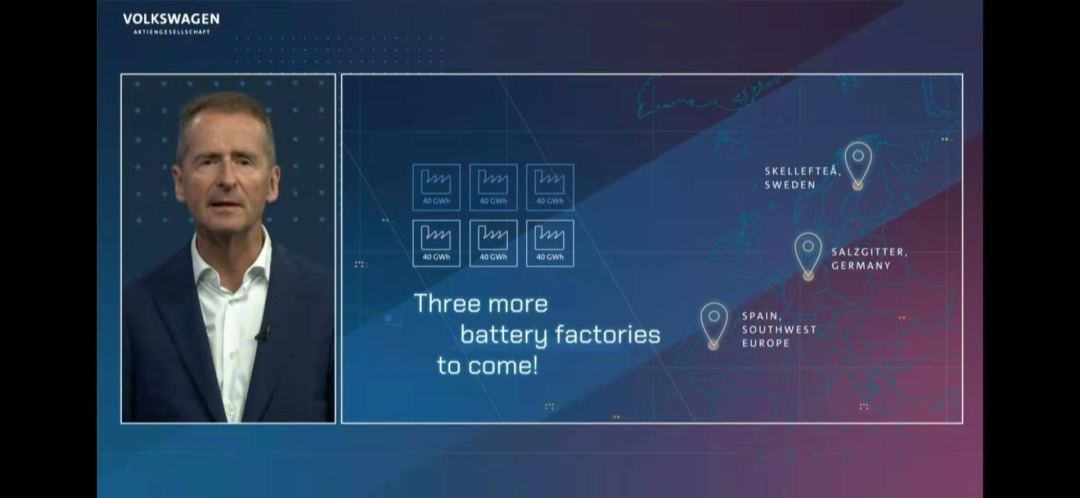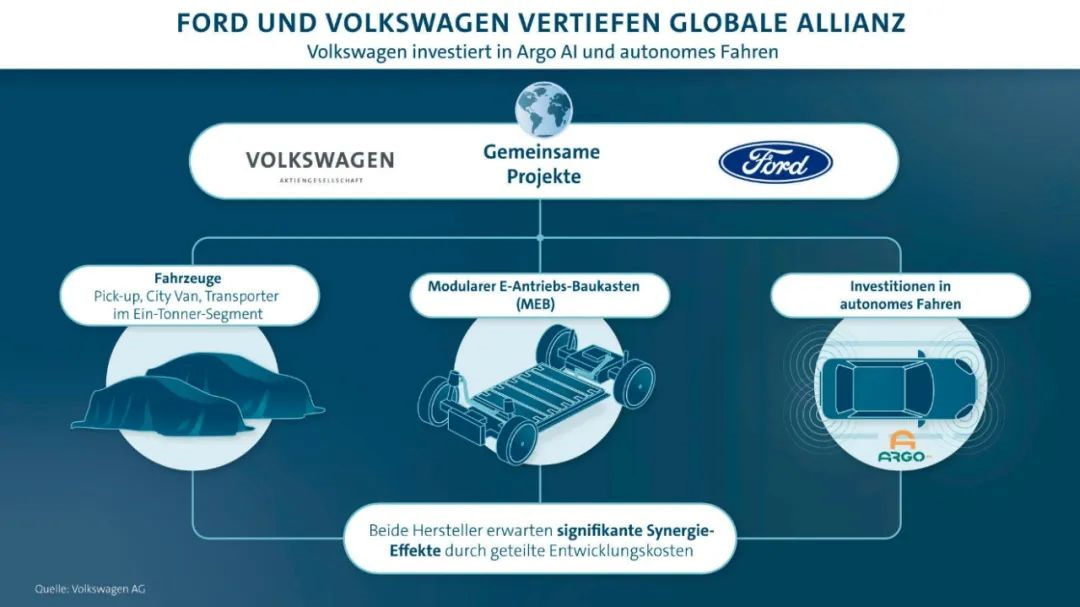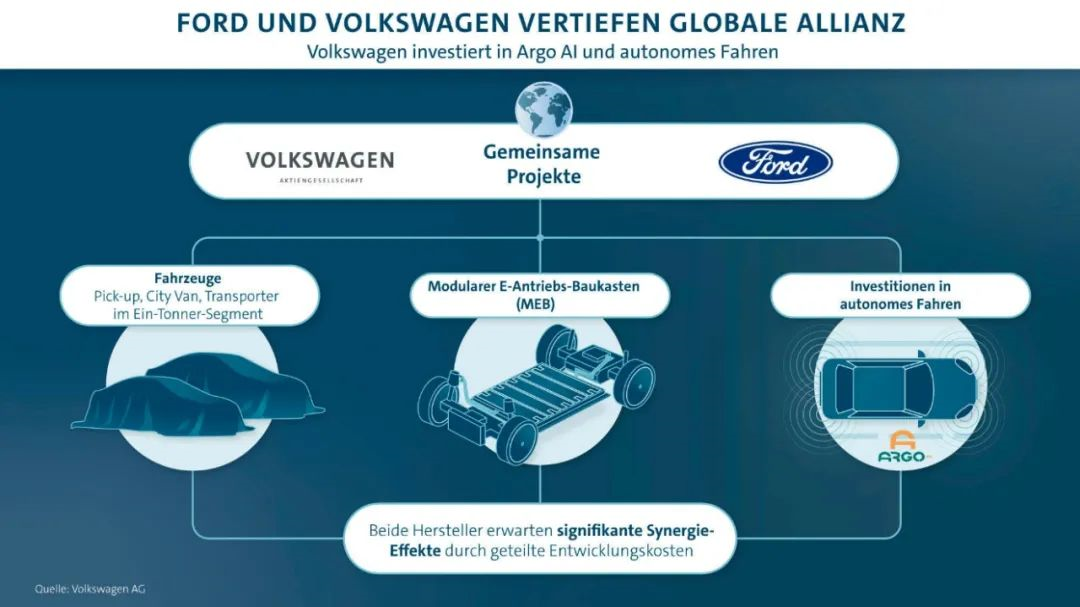When Giants Get Used to Being Invincible, Will They Bow?
Author | Roomy
Editor|Zhou Changxian
The answer is yes. Even if unwilling, the brutal market always oppresses the invincible giants, forcing them to learn to bow and reflect on their actions.
Recently, Bill Ford hinted at a trace of “bowing” in his interview with Jason Stein’s podcast, but there was also an obvious reluctance. He believes that the absence of traditional automakers ensures Tesla’s victory, and the research directions of the top four automakers (Toyota, Volkswagen, General Motors and Ford) are wrong.
Allowing Tesla to do its own thing without any real competition is not just “Detroit-style arrogance,” but also ignorance from Japan and Europe.
However, after a brief moment of bowing, Ford once again picked up his confidence saying, “The electric vehicle offensive launched by European and American automakers may bring some challenges to Tesla.”
To be more specific, Ford and Volkswagen will join forces on the road to electrification to fight against the “common enemy” Tesla. The collapsed Detroit and the warm Europe will never give up.
Musk Sets Up the Third Chapter of Tesla’s Strategic Blueprint
Recently, Bill Ford, Executive Chairman of Ford, gave a “very confident” interview, not negatively. In his own words, “I am confident that Ford has the ability to catch up with Tesla and win the electric car race.”
Tesla is the benchmark and opponent that all car companies must face in their transformation. However, Bill Ford believes that Tesla’s success is not because of Musk, but because traditional car companies ignored it. “Tesla had a competitive advantage for a long time because the entire (traditional) car industry chose to deceive itself.”
Small Ford did not mention Musk, but we can imagine that Musk must have scoffed at Ford’s words, as he and Ford have exchanged jibes many times. Currently, there is no “you come, I go” going on.
In fact, Bill Ford’s words make sense. Tesla’s success is inseparable from the “right time and place”. This gift lasted for sixteen years.
On August 2, 2006, Musk released “Tesla’s Secret Blueprint,” which outlined four things he wanted to do: produce sports cars, use the profits to produce affordable cars, and use the profits to produce even more affordable cars, all while providing zero-emission power generation options.
At that time, various car companies were vigorously competing for the Chinese market, with great ambitions. The spotlight did not shine on Musk, and Tesla’s first overall plan was almost ignored.If we start with what Bill Ford said, he did point out the traditional car companies’ “disregard,” giving Tesla time to grow. Eventually, Tesla launched the Roadster, Model S, and Model 3, achieving much of its strategy.
Fast forward ten years later to 2016, when neither Ford nor GM from Detroit, Volkswagen from Europe, and Toyota or Honda from Japan had a clear understanding of the threat posed by Tesla. At the time, the industry’s focus was on Toyota and Volkswagen’s global first place battle.
Elon Musk released “Tesla’s Master Plan, Part Deux” as the company delivered the Model 3 and acquired SolarCity. At that time, the pressure of losses forced Musk to live in the factory to supervise delivery. Nevertheless, his “followers” increased worldwide.
A strong signal was telling traditional giants that times had changed. Of course, the giants have yet to receive this signal clearly.
In the second part of the master plan, Musk emphasized the integration of energy storage and renewable energy production from the new Tesla Energy department and announced the Solar Roof plan and autonomous driving technology.
Musk also specifically mentioned autonomous driving. Although Tesla’s second master plan’s goal has not yet been fully achieved, Musk claimed to achieve full self-driving (FSD) by the end of this year.
Just as Bill Ford thought the traditional giants had just begun to take the right path of electrification, Musk was determined to increase the distance between them. On social platforms such as Twitter and Weibo, he announced that he was developing Tesla’s master plan part three without revealing further details, but it was enough to make traditional car companies stand on guard.
After all, at Tesla’s earnings call this year, Musk told investors that the company might consider developing a $25,000 electric car at some point.
Leapmotor Competes for 4th Ticket for Hong Kong IPO
Although Musk has not explicitly stated when he will produce a low-priced electric car, there are people who want to achieve this goal for him.
Yes, it’s Leapmotor, who has been vying for the fourth Hong Kong IPO ticket for seven years.
In July last year, Leapmotor set a goal to surpass Tesla in autonomous driving technology in three years and achieve overall sales of 800,000 units by 2025 when announcing the 2.0 strategy.Currently, Leapmotor has released 3 models, including the S01 coupe launched in January 2019, the low-end T03 model that went on sale in May 2020, and the mid-range pure electric SUV C11 that was launched in September last year.
From the overall planning, Leapmotor relies on small cars priced at less than 100,000 yuan, which accounted for 89% of last year’s sales, and the T03, which is priced at no more than 100,000 yuan, is referred to as the dream of surpassing Tesla in three years. However, Tesla has not yet begun to develop low-priced electric cars.
However, in Leapmotor’s view, the C11 model meets its own positioning as a “mid-to-high-end model,” which is currently the most expensive model on sale with a price range of 150,000 to 200,000 yuan, but its sales account for only 9%. Leapmotor’s goal is to break into the most fiercely competitive mid-to-high-end market priced between 100,000 and 300,000 yuan.
Therefore, this time Leapmotor’s purpose for the Hong Kong IPO is to get more money and do more self-research. So, Zhu Jiangming, who “does not play with concepts or tell stories,” must also tell stories in the capital market.
Capital is the most realistic, but it also needs stories to impress. The footnote to Leapmotor’s story this time is “self-research throughout the field.” Zhu Jiangming once said that self-research throughout the field is more high-end than full-stack self-research. Whether charming or not, the capital market still needs to weigh it for itself.
However, the concept of “self-research throughout the field” proposed by Leapmotor cannot be easily transformed into market competitiveness at this stage.
From the year 2006 when Tesla was ignored to now when Musk sits firmly as the world’s richest man, from Wei Xiaoli’s consecutive listing on the Hong Kong stock market, these years have seen capital markets becoming increasingly calm and rational, bringing money only to good ideas.
In other words, the four words “self-research throughout the field” cannot easily impress the capital market because for Leapmotor, the cost of self-research throughout the field is that it net lost 65,000 yuan for every car sold last year. The higher the sales volume, the greater the loss, a very contradictory existence. Last year, Leapmotor delivered a total of 43,000 vehicles, ranking sixth, with a net loss of over 2.8 billion yuan.
Could the market pay for Leapmotor’s dream of making cars in this not-so-good fundraising environment, just as Musk survived the years of consecutive losses and won the favor of the capital market, occupying the only vent?朱江明 is doing his best without knowing.
“The enemy of my enemy is my friend”
Returning to the interview with Bill Ford, he also said, “If we carefully look at Tesla’s growth trajectory over the years, we’ll find that other car companies are just beginning their journey toward electric vehicles.”
Other car companies, including Ford and Volkswagen.
For Volkswagen CEO Diess, perhaps he doesn’t agree with Bill Ford’s remarks. Because over the past few years, Volkswagen’s transition to electrification has been of utmost importance, even to the point of being a “gamble.”
Diess has spared no effort.
“We’ve always known that the competition in the electric vehicle game, for all players, is a new game starting from scratch, but at the same time, global market base, technology, brand power, and product quality give Volkswagen the ability to participate in this competition.”
Once holding three titles of VW Group CEO, VW Brand CEO, and VW China CEO, the ambitious Diess began to lead Volkswagen through its transformation. However, with ID.3’s production difficulties, and ID.6 and ID.4 falling short of expectations in the Chinese market, Volkswagen Group began to pave the way for Diess’s departure.
Now, Diess’s situation is that Volkswagen cannot give up on him for the time being, because he still has the support of Porsche and the Piëch family. The electrification and digitization transformation led by Diess has entered a deep-water area, and he must continue to deepen the transformation road with this support.

There’s not much time left for Diess. With unforeseeable events, the outbreak of the Russia-Ukraine war sounded the alarm that the auto industry would be deeply affected. On March 15th’s Volkswagen Group press conference, Diess once again emphasized that the impact of the Russia-Ukraine war on the automotive industry and the European economy may be more severe than that of the pandemic.
Since they cannot obtain electrical wiring systems produced in Ukraine, Volkswagen had to suspend production at its Zwickau and Dresden plants in eastern Germany in early March. These plants produce electric cars based on the Volkswagen MEB platform.
The latest financial report data from the Volkswagen Group shows that the Group’s profit has risen to 20 billion euros, but in its second home, Volkswagen China’s profit has fallen for the fifth consecutive year. After experiencing the double impact of the pandemic and chip shortage, sales have yet to stop falling and rebound.
Perhaps because of its global impact, all car companies are caught in this predicament, and Diess has also shown some optimism. He believes that Volkswagen’s shrinking market share in China is only limited by the chip shortage. With the increase in chip supply and the product line in the field of gasoline cars, “I’m sure we’re regaining our share of the Chinese market.”And he once again affirmed the achievements Volkswagen has made in electrification, “Volkswagen Group’s delivery of purely electric vehicle models has almost doubled in 2021, exceeding 450,000. “In Europe, Volkswagen Group’s electrification strategy is paying off, with one out of every four electric vehicles sold coming from Volkswagen Group.
Bill Ford may also be concerned about Volkswagen’s electrification achievements in addition to Diess. Previously, Volkswagen and Ford formed a strategic alliance and collaborated in the fields of electric vehicles, commercial vehicles, and autonomous driving technology.
The day before the brand launch, Volkswagen Group also announced news that it will expand its cooperation with Ford in the future and produce Ford’s second purely electric vehicle model based on the MEB platform. The production volume of Ford’s MEB model is expected to double within 6 years, reaching a scale of 1.2 million units.
The logic behind this giant alliance that benefits each other goes back to Bill Ford’s interview, “The game is changing, and European and American car manufacturers have launched a strong attack, and the competition is becoming increasingly fierce.”
Facing Tesla, the enemy’s enemy is a friend.

This article is a translation by ChatGPT of a Chinese report from 42HOW. If you have any questions about it, please email bd@42how.com.
